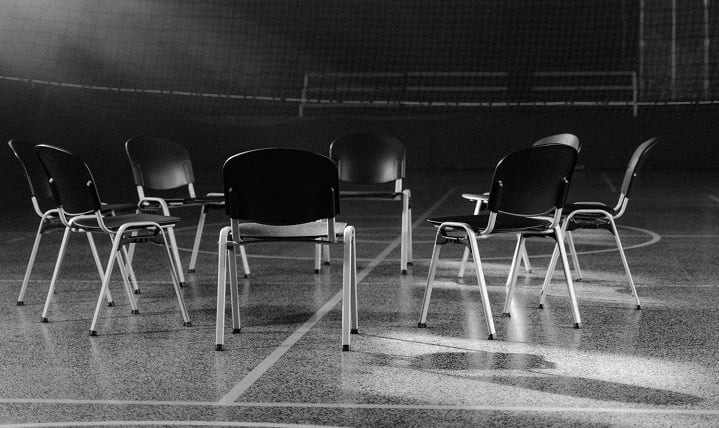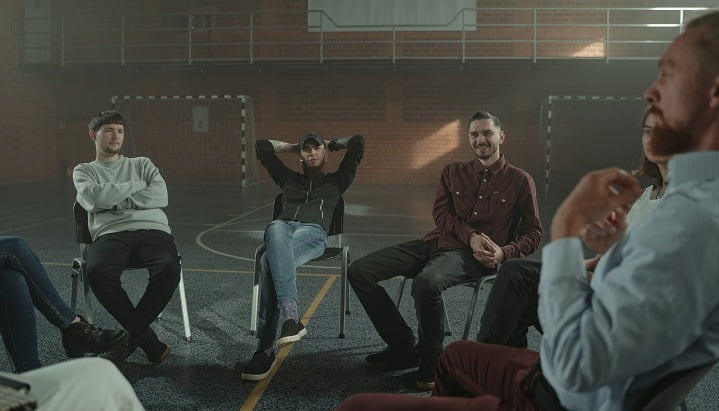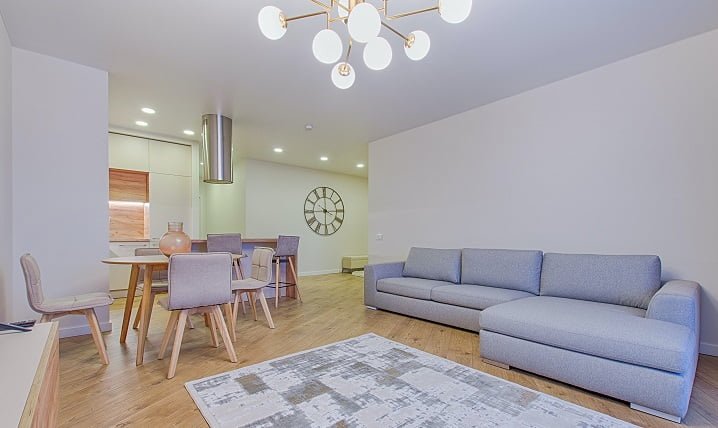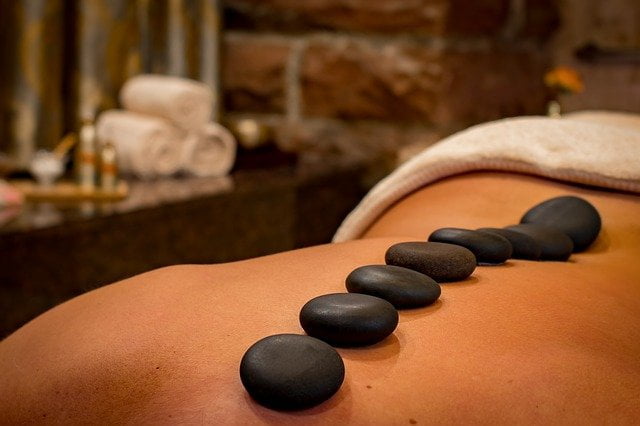Drug Rehab & Alcohol Rehab in Devon & Near Devon
Quick links for drug and alcohol rehab in Devon and near Devon
- What are the benefits of drug rehab and alcohol rehab in Devon?
- Private vs council-funded drug rehab and alcohol rehab in Devon – Which is better?
- Why is residential drug rehab and alcohol rehab in Devon not for everyone?
- What are the alternatives to going to drug rehab and alcohol rehab in Devon?
- What is the admissions process like for drug rehab and alcohol rehab in Devon?
- How much does drug rehab and alcohol rehab cost in Devon?
- What are some tips for choosing the right drug rehab and alcohol rehab centre in Devon?
- How long does drug rehab and alcohol rehab in Devon last?
Is your consumption of drugs and/or alcohol getting out of hand? Or perhaps you suffer from a history of alcoholism or drug addiction? You may benefit from drug and alcohol rehab in Devon.
No matter what your circumstances may be, you can be assured Rehab Recovery is on hand to transfer you to a place where you no longer rely on drugs or alcohol to ‘get through your day.’
Rehab Recovery offers a range of alcohol and drug addiction treatments in Devon or near Devon that are designed to secure your long-term recovery from drug and alcohol use.
Drug and alcohol rehab centres in Devon and near Devon offer services for every type of addiction, [4] including:
- Benzodiazepine addiction
- Ketamine addiction
- Behavioural addictions
- Cannabis use disorder
- Alcohol addiction and binge alcohol drinking
- Cocaine dependence and crack cocaine addiction
- Codependency
- Eating disorders
- Gambling addiction
- Opioid use disorders
Get the help you need from a drug and alcohol rehab Devon by calling our expert team today on 0800 088 66 86
What are the benefits of drug and alcohol rehab in Devon?

Two people talking about alcohol addiction at a drug and alcohol rehab centre in Devon or near Devon
An easier question to answer would be ‘What are the drawbacks of alcohol rehab?’
For patients who present a readiness to recover, alcohol rehab is beneficial for their mental health, physical health, and ability to stay sober permanently.
Combining a medically-assisted drug or alcohol detox, rehab therapy and aftercare, alcohol rehab ticks all boxes when it comes to comprehensive addiction treatment.
Treatments at drug and alcohol rehab are given by medical professionals, so the patient is in the safest possible place in case of a medical emergency.
A study by Costello [23] found that the most successful treatment for alcoholism is ‘small programs using a variety of intensive techniques’, which is exactly what drug and alcohol rehab in Devon and near Devon provides.
As each treatment centre approaches addiction recovery differently, we can only cover the specific benefits when we have helped you find the right drug and alcohol rehab in Devon or near Devon.
Secure a place at your ideal drug and alcohol rehab in Devon or near Devon by contacting our experts on 0800 088 66 86
Does drug and alcohol rehab Devon practice complete abstinence?

Two people walking through a forest during outdoor therapy at a drug and alcohol rehab centre in Devon or near Devon
If you attend a drug and alcohol rehab centre for a drug or alcohol addiction in the Devon area, your aim will be to achieve complete abstinence and the removal of substances in your body, rather than temporarily stopping your consumption.
Therefore, your time at drug and alcohol rehab in Devon will be mostly spent on achieving abstinence.
Reducing your intake of an addictive substance at drug and alcohol rehab simply is not enough to fully recover.
Experts have agreed [21] that abstinence is far more effective than harm reduction or moderation management at drug and alcohol rehab.
By achieving complete abstinence while at drug and alcohol rehab in Devon, you will gain better sleep, improved memory and better overall physical and mental well-being.
Ensure that you have the best chance to achieve abstinence at a drug and alcohol rehab in Devon or near Devon by calling us today on 0800 088 66 86
What are the benefits of residential drug and alcohol rehab in Devon or near Devon?

Outdoor photo of a drug and alcohol rehab clinic
If you attend a drug rehab and alcohol rehab centre in the Devon area, then you will receive a whole host of benefits, including the following:
- The Best Environment – By attending residential drug rehab and alcohol rehab, you will be placing yourself in the best possible environment to recover. You will be surrounded by other individuals who are also hoping and trying to recover, as well as drug rehab and alcohol rehab healthcare professionals who will also motivate you.
- Removed from any Temptations – In addition to this, at drug rehab and alcohol rehab you will be removing yourself from any temptations that might exist at home or during your daily, normal life and routine. These could include friends, family members, places or actual exposure to the addictive substance.
- Time to Reflect – By giving yourself some time away from your daily life, a lot of emphasis will be placed on reflecting on your addiction and day-to-day life. You will be given the opportunity to reflect on the past, present and future as well as your long-term recovery plans.
- 24/7 Care and Support – By attending residential drug rehab and alcohol rehab in the Devon area, you will receive 24/7 care and medical support from professionals.
- Top of the Range Treatment – In addition to these many benefits, by attending residential drug rehab and alcohol rehab in the Devon area, you will receive the very best treatment possible. You will be assessed upon arrival, and given a personalised drug or alcohol rehab treatment plan that caters for your needs.
Enjoy the many benefits of a drug and alcohol rehab in Devon by giving our team a call today on 0800 088 66 86
Private vs council-funded drug and alcohol rehab in Devon – Which is better?

Empty chairs set up for a group therapy session at a drug rehab and alcohol rehab clinic in Devon or near Devon
Lots of people in the UK get confused when it comes to private and NHS drug and alcohol rehab.
In reality, there is no such thing as NHS rehab, only NHS-funded drug and alcohol rehab treatment.
Unfortunately, due to cuts in the NHS, they are not able to provide NHS drug and alcohol rehab centres, only NHS-funded places and beds in private drug and alcohol rehab centres.
1. Cons of Private Drug and Alcohol Rehab in Devon
The biggest con of attending private drug rehab and alcohol rehab in Devon is that it is expensive. Read below for some more information on how much drug and alcohol rehab costs.
2. Pros of Private Drug and Alcohol Rehab in Devon
Whilst private drug and alcohol rehab might be expensive, there are many pros to attending. For example, you will completely skip the waiting list which can sometimes take weeks, if not months.
You will also receive top-of-the-range treatment options, as well as a relapse prevention plan that will help you stay sober when you leave drug rehab and alcohol rehab in Devon.
3. Cons of NHS-Funded Drug and Alcohol Rehab in Devon
By attending NHS-funded drug and alcohol rehab, you will have to endure the long waiting list that can have you waiting up to months to receive treatment.
You will also get less one-to-one time with healthcare professionals and might be treated for a mental health issue or dual diagnosis separately.
4. Pros of NHS-Funded Drug and Alcohol Rehab in Devon
The main benefit of receiving NHS-funded drug and alcohol rehab is that you will not have to pay for your time in rehab or your treatment.
For help choosing between private or NHS drug and alcohol rehab in Devon, give our expert team a call today on 0800 088 66 86
Why is residential drug and alcohol rehab in Devon not for everyone?

Exterior picture of a luxury drug and alcohol rehab clinic
Whilst there are a whole host of benefits to attending residential drug and alcohol rehab, unfortunately, it is not for everyone.
In fact, you might only be deemed suitable for residential drug and alcohol rehab if you meet the following criteria.
- If you suffer from suicidal thoughts or have in the past.
- If you drink more than thirty units of alcohol every day.
- If you’ve tried to recover from drug or alcohol addiction in the past multiple times but failed each time.
- If you suffer from a significant mental health condition.
- If you’ve ever been violent whilst drunk or on drugs.
- If you suffer from Wernicke’s Encephalopathy or delirium tremens.
The DSM-IV-TR [24] also has a list of diagnostic criteria that is also used by professionals to assess whether or not someone is suitable for residential drug and alcohol rehab.
- If you have continued to abuse drugs or alcohol for a long period of time, despite understanding the harm it is doing to your body.
- If you have an extremely high tolerance to drugs or alcohol.
- If you have continued to abuse drugs or alcohol for a long period of time to avoid any unpleasant drug or alcohol withdrawal symptoms.
For help choosing between private and NHS rehab in Devon, give our expert team a call today on 0800 088 66 86
How do I know if I need drug and alcohol rehab in Devon or near Devon?

Therapist and patient having a conversation about alcohol addiction at a drug and alcohol rehab clinic in Devon or near Devon
It can be tricky to work out the timing of rehab in Devon. Perhaps you have periods of being on track with sobriety, and then periods of relapse.
You may hope that one day, everything will fall into place without the help of professional rehab.
However, it would be a mistake to trust that you will miraculously recover one day.
Even if you’re currently doing well, relapse is always a serious threat. Going to rehab in Devon is the best way to lower your risk permanently.
Once you’ve completed the drug and alcohol rehab program (including aftercare), you will have everything you need to cope independently when temptation strikes.
If you decide against this at rehab, there is a chance that you will relapse in a life-threatening way.
Severe withdrawal symptoms [25] can cause dehydration, elevated blood sodium levels, and heart failure. This is commonly associated with ‘cold turkey’ withdrawal, rather than the tapering method that takes place at drug and alcohol rehab.
Rehab provides you with the safety measures that are necessary in the transition from drug use to sobriety.
The risk of passing away from withdrawal at a rehab treatment centre is much lower than the risk of dying when supervision is not available.
For people with mild dependence issues, the risk is much lower. However, to avoid developing a severe addiction in the future, we still recommend completing a full 28-day programme at drug and alcohol rehab in Devon.
Ultimately, if you are concerned about your drug habits in any way, you shouldn’t rule out drug and alcohol rehab as a way to control your addictive behaviours and prevent relapse.
Not sure if drug and alcohol rehab in Devon is right for your needs? Talk it over with our experts on 0800 088 66 86
What are the alternatives to going to drug and alcohol rehab in Devon?

Woman meditating on a bed at a drug rehab and alcohol rehab in Devon or near Devon
Professionally supported drug and alcohol rehab is one of the best ways to recover from addiction, but it isn’t for everyone.
Thankfully there are many alternative services to drug and alcohol rehab available in Devon.
1. SMART Meetings in Devon
SMART group meetings are a fantastic alternative to attending residential rehab and will help you with your motivation to recover, ignoring and overcoming your cravings, triggers and any other negative emotions.
2. AA or Narcotics Anonymous in Devon
In addition to SMART meetings, there is also Alcoholics Anonymous [26] or Narcotics Anonymous [27]. Both groups have been around for a very long time, so are very much tried and tested.
They believe in the 12-step method, which gives you motivation, support and advice through the concept of a higher power.
3. Home Detox in Devon
If group therapy at drug and alcohol rehab just is not for you, then you should consider a home drug or alcohol detox.
By receiving a home detox, you will receive daily, one-to-one phone calls from rehab healthcare professionals as well as personalised medication in the post.
4. Al-Anon Family Group Meetings in Devon
Group family meetings are also another form of alternative drug and alcohol rehab treatment. By attending meetings with your family, they will better understand your addiction whilst learning how to help you move forward.
5. Outpatient Treatment Via a Local Drug & Alcohol Rehab Team in Devon
If you’re unsure about residential drug and alcohol rehab, then outpatient treatment might be for you.
By attending outpatient drug and alcohol rehab treatment, you will be able to receive one-to-one, daily treatment and care from healthcare professionals whilst going home each day to live your normal, daily life.
Whatever help you need – whether from a conventional drug or alcohol rehab in Devon, or from one of these excellent alternative drug addiction treatment services – give our expert team a call today on 0800 088 66 86
What is the admissions process like for drug and alcohol rehab in Devon?

Alcohol support group at a drug and alcohol rehab in Devon or near Devon
When it comes to recovering from a drug or alcohol addiction in Devon or near Devon, it’s important to understand the drug and alcohol rehab admissions process and criteria.
The ASAM (American Society of Addiction Medicine)[28] uses a range of factors and dimensions to determine if someone is suitable to be admitted into drug and alcohol rehab.
Dimension 1 of Drug and Alcohol Rehab – Drug and Alcohol Detox History and Potential
If you want to be admitted to a drug and alcohol rehab centre in the Devon area, then it’s important for healthcare professionals to understand how likely it is that you’ll complete a detox programme.
They will look at both your detox history and potential, by looking at how many times you’ve tried to detox in the past. This will help the team to determine what kind of rehab treatment options are best for you.
Dimension 2 of Drug and Alcohol Rehab – Physical Well-being
Before you can be admitted to a drug and alcohol rehab centre Devon, healthcare professionals will want to assess your physical well-being. They will want to know about any underlying physical health issues so that they can treat your detox and withdrawal symptoms properly and safely.
Dimension 3 of Drug and Alcohol Rehab – Mental Well-being
In addition to your physical health, your mental health will also be assessed at drug and alcohol rehab. It’s important that you are assessed psychologically so that the team can provide you with the best therapy and treatment options.
Dimension 4 of Drug and Alcohol Rehab – Your Commitment to Drug or Alcohol Recovery
If you want to be admitted to a drug and alcohol rehab centre in Devon, then you will need to be committed to the cause. On admission, this will also be assessed.
Dimension 5 of Drug and Alcohol Rehab – Drug and Alcohol Relapse History
It’s also important that healthcare professionals are aware of any previous attempts to recover in drug and alcohol rehab in the past and to understand whether or not you have ever relapsed.
This is important to understand so that healthcare professionals can avoid any previously unsuccessful drug and alcohol rehab treatment options.
Dimension 6 of Drug and Alcohol Rehab – Home Environment
In order to ensure that you are able to remain sober when you leave drug and alcohol rehab, the team will try to determine what your home environment looks like. This is because there are often a lot of unhelpful triggers at home.
Once the drug and alcohol rehab professionals have assessed you on these six dimensions, your addiction will be categorised into a mild, moderate or severe addiction.
Start the admissions process for a drug and alcohol rehab in Devon today by calling us on 0800 088 66 86
Can I force my loved one to go to drug and alcohol rehab in Devon or near Devon?
In the UK, it is not legal to force a loved one to go to drug and alcohol rehab. Similarly, all rehab patients are allowed to leave treatment whenever they want to (although this may not necessarily be advised).
The exception is if your child is battling addiction. As they are under 18, you can make the decision for rehab on their behalf.
Just because certain interventions allow this to happen does not mean it’s the optimal method for getting your teen into rehab.
It is understandable that you would want to force your teen to get professional drug and alcohol rehab help in Devon. When someone is deep in addiction, they make choices that leave their relatives feeling frustrated and overwhelmed.
However, removing your child’s choice will not result in a successful rehab recovery. They have to get help when they are ready, and this often takes time.
Before jumping to severe measures for drug and alcohol rehab (which could be necessary in life-threatening scenarios), explore models such as child-parent psychotherapy or systemic interventions. [33]
Make sure that your loved one gets the help they need from a drug and alcohol rehab in Devon by calling our team today on 0800 088 66 86
How much does drug and alcohol rehab cost in Devon?

Kitchen area at a residential drug rehab and alcohol rehab centre
If you’re looking to attend a drug rehab or alcohol rehab centre in the Devon area, then you should be aware of the associated cost of attending drug and alcohol rehab.
The cost of drug and alcohol rehab depends on how long you stay there, as well as if you opt for a private or shared room.
A 10-day drug and alcohol rehab programme in a single room costs between £3,000 and £6,000, whereas a shared room is a lot cheaper, at £2,000 – £4,000.
If you stay for a longer period of time, say 28 days, then you should expect between £8,000 – £10,000 for a private rehab room and £6,000 for a shared room.
If these costs are too expensive for you, then you should speak to your doctor about receiving NHS-funded rehab.
To learn how much your stay at a drug and alcohol rehab in Devon is likely to cost, give our team a call today on 0800 088 66 86
I can’t afford drug and alcohol rehab in Devon and I don’t have insurance – what can I do?

Patients and therapist talking about alcohol addiction at a drug rehab and alcohol rehab clinic in Devon or near Devon
The first step would be to check for NHS-funded treatment options in Devon.
Although they are usually unavailable, it’s always worth a try. Rehab patients with NHS-funded care often do not have to pay towards their care; it works the same way as staying in an NHS hospital.
If you happen to have private health insurance through work or another means, you may be able to get free or discounted rehab treatment. Check with the insurance provider to find out what is covered.
To keep rehab costs low, you could pay for just one phase of treatment. For example, if you have a heroin addiction, you could undergo a heroin detox at drug and alcohol rehab and then utilise free self-help groups in Devon after this instead of staying at that drug and alcohol rehab clinic.
Individuals who cannot afford any element of drug and alcohol rehab can go to self-help meetings as often as desired for the rest of their life. Organisations such as Alcoholics Anonymous and Narcotics Anonymous offer free meetings in Devon on a regular basis.
We cannot promise that the results will be as great – drug and alcohol rehab in Devon is our top recommendation for most patients. However, attending 12-step meetings is without a doubt a much better strategy than avoiding professional help altogether.
It is proven [34] that these groups lead to a decrease in alcohol and drug use, whereas attempting to get sober alone without rehab or support groups is associated with frequent relapse.
Whatever help you need from a drug and alcohol rehab in Devon to overcome addiction, talk to us today on 0800 088 66 86
What are some tips on choosing the right drug and alcohol rehab centre in Devon?

Alcohol support group holding raised hands at sunset outside of a drug and alcohol rehab clinic in Devon or near Devon
If you want to receive addiction counselling at a rehab centre in Devon or near Devon, then read the below tips.
It’s important that you choose the right drug rehab and alcohol rehab centre in Devon for your needs.
- Look for drug rehab and alcohol rehab centres that have been open a while.
- Look for drug rehab and alcohol rehab centres that have good reviews and testimonials.
- Speak to your doctor about what kind of treatment needs you will need and seek out drug rehab and alcohol rehab centres that have a good reputation for these treatment options.
- Read up on residential and outpatient drug rehab and alcohol rehab to understand the difference.
- Consider the costs of drug rehab and alcohol rehab very carefully.
- Ask to speak to a member of the drug and alcohol rehab team to talk you through their process.
Make sure that you choose the perfect alcohol and drug rehab in Devon for your needs by calling us today on 0800 088 66 86
How do I prepare for drug and alcohol rehab in Devon?

Person typing on a laptop at a drug and alcohol rehab centre in Devon or near Devon
Recovery rehab programmes in Devon are centred around the idea of relapse prevention. [35]
This principle should be taken into account before the patient even steps foot in drug and alcohol rehab.
This means that you should only go to rehab if you feel you are ready, otherwise your relapse risk is heightened.
Preparing for rehab is difficult as you have to battle complex emotions while remaining practical. Get as much support as possible from your loved ones, as you do not need unnecessary stress on your plate.
With the help of people you trust, start to plan:
- Taking time off work
- Asking someone to house sit/pet sit
- Packing your suitcase
- Informing people (e.g., employer, family members) if desired
- Organising bills
- Establishing healthy sleep hygiene
- Arranging childcare
Liaise with your rehab treatment centre to confirm what you need to plan. If you are allowed to take your mobile phone, it’s a good idea to remove any contacts who are bad influences in terms of your addiction.
Ensure that you have everything you need at an alcohol and drug rehab in Devon by talking to our team on 0800 088 66 86
What is a detox and do I need one at rehab in Devon?

Picture of a garden at a drug and alcohol rehab centre in Devon or near Devon
If you’re hoping to attend a rehab centre in the Devon area, then it is important that you understand what a detox is, and whether or not you need one.
Detox at rehab is when an individual abstains from an addictive substance in an attempt to rid the body of that substance.
If you’re addicted to drugs or alcohol, then you will most likely need to attend a rehab detox programme before you can receive any other help or treatment, such as therapy.
That is why it is really important to detox in a safe environment such as a rehab centre.
Drug and alcohol withdrawal symptoms include:
- Excessive sweating
- Excessive shaking
- Anxiety
- Paranoia
- Severe feelings of agitation
- Insomnia
If you undergo your detox at a rehab centre, then it is likely that you will be assisted by the prescription drug Librium. Librium is a medication commonly given to those struggling with alcohol withdrawal symptoms and anxiety.
You may also be prescribed Chlordiazepoxide or Acamprosate at rehab, [36] alongside specific anti-anxiety medications like SSRIs [37]. Detox with the support of medicine is known as a medically-assisted drug or alcohol detox.
This is just one of several prescription drugs that are commonly used to tackle addiction at a drug or alcohol rehab clinic in Devon.
Continued abuse of substances such as alcohol or drugs can cause long-term complications, which include but aren’t limited to:
- Alcohol Seizures
- Wernicke Encephalopathy [38]
- Delirium Tremens
- Hepatitis
If you are affected by a substance use disorder, you may have developed a physical dependence. This means that your body physically needs the substance and that stopping cold turkey could be very dangerous [39]. You could get alcohol withdrawal syndrome (for those addicted to alcohol).
Physical dependence on heroin is also very dangerous due to the heroin withdrawal process and should be monitored by doctors or medical staff at rehab.
Make sure that your detox is effective and lasting with the help of one of the many effective drug and alcohol rehab clinics in Devon – give our team a call today on 0800 088 66 86
How long does drug and alcohol rehab in Devon last?

Couple walking during outdoor rehab at a drug and alcohol rehab in Devon or near Devon
On average it takes a person between six months and five years [40] to overcome addiction, however rehab will not last this long.
The length needed in rehab is different for each person.
However, there is often a 7-day minimum rehab stay for those undergoing alcohol detox, and 28 days is also often recommended to then focus on your treatment, which includes things like therapy and relapse prevention planning.
However, it’s important to remember that you might not need to attend a detox programme prior to your recovery treatment at rehab. This depends greatly on what type of substance you are addicted to.
For example, if you are addicted to alcohol, opioids (Buprenorphine) or benzodiazepines, then you will need to undergo a detox at rehab first. However, if you’re addicted to cannabis or cocaine then you will not need to.
This is because drugs like alcohol and opioids are physically addictive as well as mentally, whereas cocaine and cannabis is only mentally addictive.
Maintaining sobriety is no easy feat, but we are here to help you on this journey. At drug and alcohol rehab you will learn new coping mechanisms and relearn your ways of thinking. Rehabs provide person-centred care and can give you options on sober living houses after you leave the facility if needed.
To find out how long you are likely to stay at a drug and alcohol rehab in Devon, give our team a call today on 0800 088 66 86
What types of addiction are treated at drug and alcohol rehab in Devon?

Doctor holding a clipboard at a drug and alcohol rehab in Devon or near Devon
The most common type of addiction that is treated at drug and alcohol rehab in Devon is substance addiction, which refers to any addiction involving a particular consumable substance,
This can include:
- Alcohol addiction
- Cannabis addiction
- Acid/LSD addiction
- Ketamine addiction
- Opioid addiction
- Benzodiazepine addiction
- Amphetamine addiction
- Prescription drug addiction
Behavioural addictions also respond well to inpatient drug and alcohol rehab treatment in Devon and near Devon.
Some examples of behavioural addictions treated at drug and alcohol rehab in Devon include:
- Shopping addiction
- Binge eating disorder
- Sex and love addiction
- Work/study addiction
- Gambling addiction
- Gaming addiction
Whatever the addiction you are suffering from, get help from a drug and alcohol rehab in Devon by giving us a call on 0800 088 66 86
How do I access cocaine rehab in Devon?

Living space at a residential drug and alcohol rehab centre
Cocaine is a psychologically addictive drug, one that can be extremely hard to beat without attending cocaine drug and alcohol rehab.
However, it is not physically addictive. Because of this, you will not need to attend a cocaine detox at rehab.
However, you will still need to attend drug and alcohol rehab in Devon for lengthy treatment and therapy so that you can overcome the physiologically addictive side of cocaine or crack cocaine addiction.
Overcome your addiction to cocaine with the help of a drug and alcohol rehab in Devon – call us today on 0800 088 66 86
How do I access heroin rehab in Devon?

Woman stood with a cup of coffee after treatment at a drug rehab and alcohol rehab in Devon or near Devon
Unlike cocaine, heroin is both mentally and physically addictive.
Therefore, if you are suffering from heroin addiction, you will need to undergo both a physical heroin detox and an extensive heroin treatment plan at drug and alcohol rehab.
These drug and alcohol rehab treatment options will include therapy such as CBT, DBT, group therapy and family therapy.
Overcome your addiction to heroin with the help of a drug and alcohol rehab in Devon – call us today on 0800 088 66 86
How do I access cannabis rehab in Devon?

Alcohol recovery patients bumping fists at a drug rehab and alcohol rehab clinic in Devon or near Devon
If you are struggling with an addiction to cannabis and living in Devon or near Devon, then you will need to attend drug and alcohol rehab.
However, as cannabis is not physically addictive, you will not need to undergo a cannabis detox at drug and alcohol rehab.
Your rehab for cannabis addiction will consist of therapy, including family therapy to help your family find ways to support you once you leave drug and alcohol rehab.
Overcome your addiction to cannabis with the help of a drug and alcohol rehab in Devon – call us today on 0800 088 66 86
What therapies are available at a drug and alcohol rehab in Devon?

Person receiving a hot stone massage during holistic therapy at a drug rehab and alcohol rehab in Devon or near Devon
The following forms of rehab therapy target the psychiatric conditions as previously mentioned above.
These treatment options are often provided in most drug and alcohol rehab centres in Devon and near Devon.
1. Brief Interventions
Brief Interventions are quick, focused sessions designed to tackle very specific challenges experienced during an individual’s drug and alcohol rehab in Devon, allowing their recovery journey to continue on at an effective pace.
2. Holistic Therapies at a drug and alcohol rehab in Devon
Holistic and alternative therapies are becoming increasingly popular at drug and alcohol rehab centres in Devon and near Devon. Holistic therapy at drug and alcohol rehab can includes activities such as art therapy, music therapy, yoga, mindfulness, meditation, acupuncture and many other treatments, depending on the resources of the rehab centre and where in Devon it is located.
3. Cognitive Behavioural Therapy at a drug and alcohol rehab in Devon
CBT at drug and alcohol rehab works to help reframe people’s thoughts and emotions into more helpful, positive and motivational ones.
It also looks into the triggers and causes of your drug or alcohol addiction [41], as well as any underlying mental health issues that might also be contributing to your addiction.
This particular approach has proven to be extremely successful [42] in drug and alcohol rehab centres both in Devon and beyond, with a relatively low rate of relapse [43] compared to other treatments. However, it should be noted that CBT tends to have a limited effect on those with learning difficulties or personality disorders [44].
4. Dialectical Behavioural Therapy at a drug and alcohol rehab in Devon
DBT is very similar to CBT in that it works to solve the underlying triggers and causes of your addiction. However, dialectical behaviour therapy at drug and alcohol rehab is used when an individual’s emotions are stronger than usual and issues are more complex.
For example, DBT is commonly used for rehab patients suffering from borderline personality disorder.
5. Motivational Interviewing at a drug and alcohol rehab in Devon
Motivational Interviewing is a therapy technique used to uncover an individual’s natural motivation to change, often working alongside Motivational Enhancement Therapy at drug and alcohol rehab in order to build up the individual’s inherent motivation to recover.
As motivation and the self-confidence it can bring are often key to a successful recovery [45], some form of motivational therapy tends to be included in every treatment programme.
6. Individual Therapy at a drug and alcohol rehab in Devon
At every drug and alcohol rehab centre, you will be given the opportunity to receive Individual Therapy with a mental health professional.
These therapy sessions are the time to assess whether or not there are any underlying triggers or causes.
7. Group Therapy at a drug and alcohol rehab in Devon
In addition to one-to-one therapy, you might be offered the chance to attend Group Therapy. This is often used when an individual feels confident enough to talk about their addiction in a group setting without the fear of being judged.
8. Family Therapy at a drug and alcohol rehab in Devon
Family Therapy is often also used when an individual suffers from triggers at home. It is used to bring the family on board in an attempt to help them better understand their loved one’s addiction and how they can help upon their loved ones return home.
9. Co-dependency Treatment at a drug and alcohol rehab in Devon
It is now common for an individual to feel co-dependent on an individual, object or addictive substance. If you are co-dependent on an addictive substance, then it is also likely that you suffer from a sense of low self-esteem, self-worth and an inability to say no and create boundaries.
Whilst at drug and alcohol rehab, during therapy you will be assessed for co-dependency and will receive treatment in the form of CBT therapy to overcome this.
10. Twelve-Step Facilitation Therapy (TSFT) at a drug and alcohol rehab in Devon
Twelve Step Facilitation Therapy is a strategy and form of treatment used by healthcare professionals to encourage individuals to attend a 12-step self-help group once they leave residential rehab.
These groups include the likes of the AA, who have a great track record of helping individuals who either don’t want to attend drug and alcohol rehab or who are attending outpatient rehab.
Other types of therapies include:
- Acceptance and Commitment Therapy
- Contingency management
- Drama therapy
- Eye Movement Desensitization and Reprocessing
- Equine therapy
- Group psychotherapy
- Motivational therapy
- Rational Emotive Behaviour Therapy
- Talking therapies
These therapies are not only beneficial to those with addictions but are also used to treat any conditions alongside addiction, such as obsessive-compulsive disorder, post traumatic stress disorders (PTSD), schizophrenia, etc. Psychiatric treatment will be provided in these instances.
Experience any and all of these effective treatments at a drug and alcohol rehab in Devon by calling us today on 0800 088 66 86
How will a rehab in Devon treat the physical and psychological components of addiction?

Couple sat laughing together in a field after drug and alcohol rehab in Devon or near Devon
If you suffer from an addiction to drugs or alcohol, effective drug and alcohol rehab treatment must address two broad issues. The first issue involves detoxification.
When you become addicted to drugs and alcohol, your body becomes addicted to these substances due to chemical reactions occurring in the brain and throughout your central nervous system.
When drug and alcohol use is suddenly halted at rehab, the brain re-adjusts to normality since drugs and alcohol no longer engage certain neurotransmitters.
At first, this may sound like a positive development. However, the brain readjusts too quickly. This readjustment in brain chemistry also brings with it a range of dangerous withdrawal symptoms. Drug and alcohol rehab in Devon and near Devon can help support you through this.
Get the help you need to beat addiction in Devon by calling us today on 0800 088 66 86
Is detoxing at a drug and alcohol rehab in Devon safe?

Two people holding a sapling at a drug and alcohol rehab in Devon or near Devon
This assessment is conducted by a psychiatrist at drug and alcohol rehab. If you didn’t know, a psychiatrist is a medical doctor.
The psychiatrist will prescribe you medication designed to slow down the pace at which your brain readjusts following the cessation of drug and alcohol use during rehab detox.
This medication prevents the onset of dangerous withdrawal symptoms such as tremors, hallucinations and a range of ‘flu-like’ symptoms.
Your detox programme at a drug and alcohol rehab in Devon requires between 7-14 days to complete.
The duration of your detox programme is determined by the severity and nature of your addiction. You will be advised on the recommended treatment duration before your rehab admission goes ahead.
Make sure that your drug detox or alcohol detox in Devon is as effective as possible by calling us on 0800 088 66 86
How would dual diagnosis affect my stay at drug and alcohol rehab in Devon?

Therapist taking notes with an alcohol support group at a drug rehab and alcohol rehab clinic in Devon or near Devon
Addiction is often simply a symptom of a deeper, psychiatric issue. If you struggle with an addiction whilst also suffering from a mental health condition, then at drug and alcohol rehab you will be said to have a dual diagnosis.
This is an incredibly common occurrence and approximately 28.6% of individuals [48] suffering from alcohol addiction will have at least one other disorder.
These underlying psychiatric issues include mental health issues [49] of every type, including:
- Anxiety
- Bipolar disorder
- Depression
- Schizophrenia
- Paranoia
- Borderline Personality Disorder and Anti-Social Personality Disorder [50]
- Post-Traumatic Stress Disorder
It’s often difficult to determine which comes first, as some people might develop a mental health issue after they become addicted to a substance.
If you want to attend a drug or alcohol rehab centre in Devon or near Devon, then speak to a member of the Rehab Recovery team today.
By doing so, you can be confident that you will be treated professionally for any mental health issues alongside your addiction at rehab.
Once you first enter rehab, your addiction will likely be treated with a physical detox.
After that, any mental health disorders will be treated at rehab.
Treatment for mental health disorders at rehab include forms of therapy such as CBT, Motivational interviewing, and group therapy.
Learn how a drug and alcohol rehab in Devon will support your mental health by calling our expert team today on 0800 088 66 86
Treating the mental aspect of addiction at a drug and alcohol rehab in Devon

Woman meditating next to a lake at a rural drug and alcohol rehab in Devon or near Devon
The next issue to tackle during your drug and alcohol rehab treatment in Devon concerns the underlying psychological problems you may experience.
These problems may be due to psychological trauma you experienced during your childhood. This trauma means a physical detox programme is seldom enough to secure your long-term rehab recovery.
If psychological trauma is not treated during your time at a Devon rehab clinic, the chances of you remaining in recovery once you return home are slim.
Beat every aspect of addiction with the help of a drug and alcohol rehab in Devon – call us today on 0800 088 66 86
Why are aftercare sessions so important after drug and alcohol rehab in Devon?

Couple stood hugging in a field after drug and alcohol rehab treatment in Devon or near Devon
When your time at a drug and alcohol rehab centre in Devon or near Devon comes to an end, a detailed aftercare and relapse prevention plan will be drawn up based on the progress you have made in overcoming addiction.
Aftercare sessions are held once a week. This allows you to return to the Devon rehab centre on an outpatient basis for around 12 months following the conclusion of residential treatment.
How effective is aftercare after drug and alcohol rehab in Devon or near Devon?
Aftercare at drug and alcohol rehab in Devon is extremely effective. It is typically in place for one full year, as the risk of relapse is very high in this period.
Patients who rely on aftercare support following rehab tend to find that it is much easier to stay sober as they aren’t alone.
With each strategy that they implement after rehab, they have the encouragement of rehab staff to propel them through.
We know that natural remission is highly likely to be followed by relapse [51].
This means patients should lean on the structure of aftercare to help them maintain long-term sobriety. Simply making an individual effort to stay sober is not enough, as all patients are extremely vulnerable when they leave drug and alcohol rehab.
Ensure that your stay at a drug and alcohol rehab in Devon is matched by an equally effective aftercare plan by giving us a call on 0800 088 66 86
Is drug and alcohol rehab in Devon the only option?

Alcohol addiction patients holding hands at a drug and alcohol rehab centre in Devon or near Devon
Residential rehab is the most successful form of treatment in Devon, as inpatient treatment creates an opportunity for the patient to be immersed in sobriety and to learn about sustainable ways to stay sober.
However, private drug and alcohol rehab is not the only option for addiction treatment in Devon.
There are many intensive outpatient drug and alcohol rehab programmes that are incredibly successful, despite not providing overnight accommodation.
Outpatient groups are sometimes more effective for people with a mild to moderate substance use disorder, especially if there are clear reasons rehab would not work e.g., a history of violence, problems with socialising, or frequent incomplete drug and alcohol rehab stays.
Other formal types of treatment include detoxing and therapy that take place outside of inpatient/outpatient rehab. For example, you could detox from a substance at home (home detox) and get private therapy for addiction.
These forms of drug and alcohol rehab treatment in Devon are always much more helpful when they are followed up.
Home detoxes that lead to an ongoing prescription of acamprosate, naltrexone or disulfiram have a higher rate of abstinence [52].
Finally, fellowship groups are available to anyone with addiction issues, including the relatives of people who are battling this.
There is no cost to doing this, and there is no expected commitment, unlike in-person rehab. However, it is recommended to attend as often as possible to boost the efficacy of the sessions.
Whether you need help from a conventional drug and alcohol rehab in Devon, or if you need the support of an alternative service, talk to our experts on 0800 088 66 86
What are some alternative services to rehab and charities available in Devon?

Therapy group taking notes at a drug and alcohol rehab in Devon or near Devon
1. EDP Drug & Alcohol Services, near Devon
Address: Basepoint Business Centre, Yeoford Way, Marsh Barton, Exeter EX2 8LB
Telephone: 08002 335 444
Website: http://www.edp.org.uk/
2. Somerset Drug and Alcohol Service (Taunton), near Devon
Address: Unity House, 10 Cannon Street, Taunton, TA1 1SN
Telephone: 0300 303 8788
Website: https://www.turning-point.co.uk/find-a-service.html#/
3. Drug and Alcohol Recovery Service – HMP Exeter
Address: HMP Exeter, 34 New North Road, Exeter, EX4 4EX
Telephone: 01392 415 650
Website: https://www.changegrowlive.org/drug-and-alcohol-recovery-service-hmp-exeter
Reach out to 12-step programs like Cocaine Anonymous, Narcotics Anonymous (NA) and Alcoholics Anonymous (AA) for help staying sober. Here, you can increase your chances of continuing your life in recovery, by sharing your journey with others.
The NHS provides reliable and free information for addictions and dependencies, as well as support through local NHS Foundation Trusts.
Smart Recovery will help you to manage relapse triggers, and provide you with tools to make peace with your thoughts and feelings.
Al-Anon are another useful service open to you and your friends and family.
Find mental health support with Rethink Mental Illness, Mind, Young Minds, Samaritans and Papyrus.
More charities and organisations you can reach out to include: National Association for Children of Alcoholics, Change Grow Live, Turning Point, We Are With You and Alateen.
Frequently asked questions about drug and alcohol rehab in Devon

Two people talking and working on a laptop at a drug and alcohol rehab clinic in Devon or near Devon
Should I stay in Devon for drug and alcohol rehab or go elsewhere?
Successful addiction recovery can happen anywhere – including in your own home. The key to success is making sure drug and alcohol rehab treatment is tailored to you.
Most people find that rehab in Devon is the best way to get sober sustainably. It’s easy to get to, easy for people to visit, and there’s no additional stress from planning long-distance journeys.
Family visits can also be extremely important in most rehab recovery scenarios.
If it’s easier for your family to visit if you stay in Devon, it is probably best to avoid travelling for drug and alcohol rehab. The material and practical support your family can provide should not be underestimated [53].
As well as helping you with the logistics of going to drug and alcohol rehab, your family can support you from a distance as you recover, and attend the rehab for visits and therapy sessions.
Yet, if you are desperate to get away from Devon, there’s no reason you can’t get sober successfully in another area. This is especially true if you have family in this other area, or your connections in Devon are not supportive of your rehab journey.
How do I tell my family that I’m going to drug and alcohol rehab in Devon or near Devon?
Before telling your family about going to drug and alcohol rehab in Devon, spend some time imagining the situation and coming up with a logical yet emotionally sensitive way of wording it.
This may sound like a hassle, but you need to explain yourself and why you need rehab in the best possible way otherwise there is a high risk of misinterpretation.
Our general advice is to speak to your family when they have plenty of time to talk and you are on good terms with them before and after you go to rehab.
Make sure you are only with people you can trust, to avoid making the situation awkward for yourself or your loved one.
You don’t need to overthink the specifics of the conversation, as you can’t control the other person’s reaction. Simply find an appropriate context and remain empathetic throughout.
Does drug and alcohol rehab for teens work in Devon or near Devon?
Yes, drug and alcohol rehab in Devon works for teens with substance problems.
By undergoing detox, therapy and aftercare, teens are in a much better position to keep on top of their symptoms and avoid relapse when you leave rehab.
Education is a key component of adolescent rehab. When teens understand the long-term effects of using substances excessively, they are more likely to make healthier decisions.
It’s also important for teens to explore the link between addiction and mental health at drug and alcohol rehab. Not everyone is aware that addiction is a type of mental illness, and this can help teens tackle feelings of shame surrounding their substance issues.
It is proven [54] that 18-year-olds with alcoholism are more likely to suffer from depression by 24 years old. By educating young people on how substances damage our functioning, rehab programmes lower the risk of relapse for this age group.
If you have any more questions about drug and alcohol rehab in Devon, give our team a call today on 0800 088 66 86
How do I get help from Rehab Recovery today?

Person typing on a phone at a drug and alcohol rehab in Devon or near Devon
All of the drug and alcohol rehab centres we recommend are regulated by the Care Quality Commission (England and Wales) or the Care Inspectorate (Scotland), as well as following guidelines from the National Institute for Health and Care Excellence.
At Rehab Recovery, we offer free advice from a team of non-judgemental professionals, many of whom are in recovery and understand how hard it can be to change your relationship with addiction.
We can link you with first-rate drug and alcohol rehab services across Devon, including in Exeter, Clovelly, Dartmouth, Torquay, Kingsbridge, Totnes, Exmouth, Salcombe, Woolacombe, Appledore, Ilfracombe, Beer, Barnstaple, Tavistock, Sidmouth, Croyde, Teignmouth, Dawlish, Budleigh Salterton, Okehampton, Tiverton, Dittisham, Ashburton, Newton Abbot, Axminster, Seaton, Bigbury-on-Sea, Great Torrington, South Molton, Crediton, Branscombe, Bideford, Chagford, Braunton, Plymouth, Bovey Tracey, Combe Martin, Ottery Saint Mary, Cockington, Paignton, Hartland, Lustleigh, Cullompton, Moretonhampstead, Holsworthy, Westward Ho!, Chudleigh, Lee, Instow, Brixham, Ivybridge, and many more.
For more information about drug and alcohol rehab in Devon, reach out to our 24/7, confidential hotline on 0800 088 66 86
References for Drug Rehab and Alcohol Rehab in Devon and Near Devon
[2] https://www.who.int/news-room/fact-sheets/detail/alcohol
[3] https://nida.nih.gov/publications/drugs-brains-behavior-science-addiction/drug-misuse-addiction
[4] https://www.ncbi.nlm.nih.gov/pmc/articles/PMC5328289
[5]
ience-addiction/treatment-recovery#:~:text=Like%20other%20chronic%20diseases%20such,regain%20control%20of%20their%20lives.” target=”_blank” rel=”noopener”>https://nida.nih.gov/publications/drugs-brains-behavior-science-addiction/treatment-recovery
[6] https://www.nhs.uk/live-well/alcohol-advice/the-risks-of-drinking-too-much
[7] https://www.science.org/doi/10.1126/science.aao1157
[8] https://www.ncbi.nlm.nih.gov/pmc/articles/PMC3654310
[10] https://www.ncbi.nlm.nih.gov/pmc/articles/PMC6876531
[11] https://www.ncbi.nlm.nih.gov/pmc/articles/PMC6876531
[13] https://www.ncbi.nlm.nih.gov/pmc/articles/PMC4402015
[14] https://www.niaaa.nih.gov/alcohols-effects-health/alcohol-topics/older-adults
[15] https://www.cdc.gov/alcohol/fact-sheets/womens-health.htm
[16] https://pubs.niaaa.nih.gov/publications/arh27-3/209-219.htm
[18] https://pubs.niaaa.nih.gov/publications/arh26-2/90-98.htm
[19] https://www.nature.com/articles/s41598-020-76182-3
[20] https://www.ncbi.nlm.nih.gov/pmc/articles/PMC6876511/
[21] https://scholar.google.com/citations?hl=en&user=VHMpXXIAAAAJ
[22] https://www.ncbi.nlm.nih.gov/pmc/articles/PMC5315690/
[23] https://www.thelancet.com/journals/lanpsy/article/PIIS2215-0366(23)00138-4/fulltext
[24] https://cdn.website-editor.net/30f11123991548a0af708722d458e476/files/uploaded/DSM%2520V.pdf
[25] https://ndarc.med.unsw.edu.au/blog/yes-people-can-die-opiate-withdrawal
[27] https://meetings.ukna.org/meeting/Devon
[28] https://www.asam.org/asam-criteria/about-the-asam-criteria
[31] https://www.mountsinai.org/health-library/selfcare-instructions/deciding-to-quit-drinking-alcohol
[32] https://www.verywellmind.com/the-craft-approach-to-substance-abuse-intervention-5191125
[33] https://www.ncbi.nlm.nih.gov/books/NBK385382/
[34] https://www.ncbi.nlm.nih.gov/pmc/articles/PMC3753023/
[35] https://www.ncbi.nlm.nih.gov/pmc/articles/PMC4553654/
[36] https://effectivehealthcare.ahrq.gov/products/alcohol-misuse-drug-therapy/consumer
[37] https://www.ncbi.nlm.nih.gov/pmc/articles/PMC5614930
[38] https://premierneurologycenter.com/blog/neurologic-diseases-associated-with-alcohol-consumption
[40] https://www.racnj.com/the-five-stages-of-addiction-recovery
[41] https://medlineplus.gov/ency/article/001522.htm
[42] https://gpsych.bmj.com/content/32/5/e100087
[43] https://pubmed.ncbi.nlm.nih.gov/32954958
[44] https://www.ncbi.nlm.nih.gov/pmc/articles/PMC7001356
[45] https://www.ncbi.nlm.nih.gov/pmc/articles/PMC6760428
[46] https://www.health.harvard.edu/staying-healthy/11-ways-to-curb-your-drinking
[47] https://www.newdirectionsforwomen.org/what-percentage-of-alcoholics-recover
[49] https://pubs.niaaa.nih.gov/publications/aa63/aa63.htm
[50] https://www.ncbi.nlm.nih.gov/pmc/articles/PMC6241194
[51] https://www.ncbi.nlm.nih.gov/pmc/articles/PMC1976118/
[52] https://www.ncbi.nlm.nih.gov/pmc/articles/PMC6299173/
[53] https://www.ncbi.nlm.nih.gov/pmc/articles/PMC4835237/
[54] https://www.thelancet.com/journals/lanpsy/article/PIIS2215-0366(23)00138-4/fulltext


